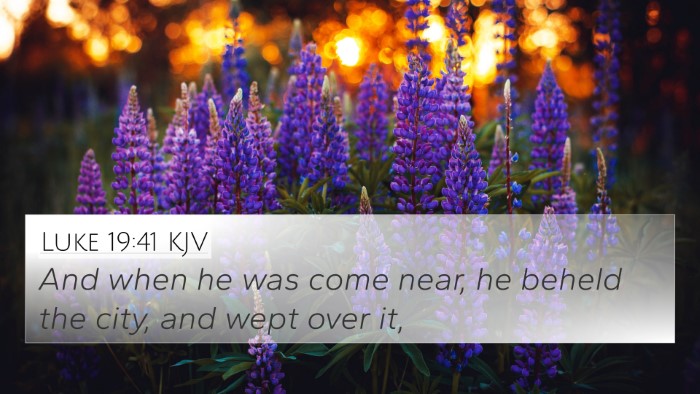Old Testament
Genesis Exodus Leviticus Numbers Deuteronomy Joshua Judges Ruth 1 Samuel 2 Samuel 1 Kings 2 Kings 1 Chronicles 2 Chronicles Ezra Nehemiah Esther Job Psalms Proverbs Ecclesiastes Song of Solomon Isaiah Jeremiah Lamentations Ezekiel Daniel Hosea Joel Amos Obadiah Jonah Micah Nahum Habakkuk Zephaniah Haggai Zechariah MalachiZechariah 11:1 Similar Verses
Zechariah 11:1 Cross References
Open thy doors, O Lebanon, that the fire may devour thy cedars.
Uncover the Rich Themes and Topics of This Bible Verse
Listed below are the Bible themes associated with Zechariah 11:1. We invite you to explore each theme to gain deeper insights into the Scriptures.
Zechariah 11:1 Cross Reference Verses
This section features a detailed cross-reference designed to enrich your understanding of the Scriptures. Below, you will find carefully selected verses that echo the themes and teachings related to Zechariah 11:1 KJV. Click on any image to explore detailed analyses of related Bible verses and uncover deeper theological insights.
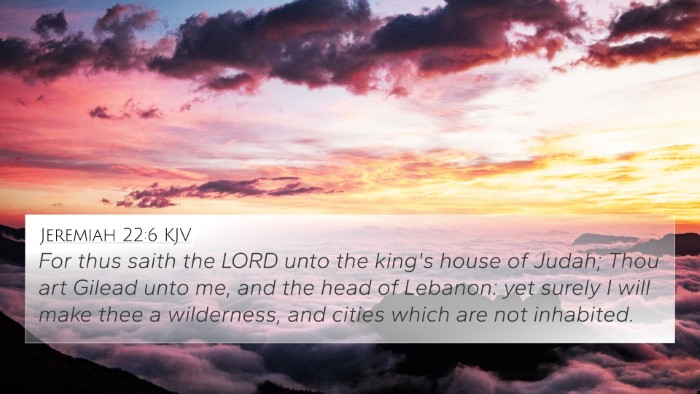
Jeremiah 22:6 (KJV) »
For thus saith the LORD unto the king's house of Judah; Thou art Gilead unto me, and the head of Lebanon: yet surely I will make thee a wilderness, and cities which are not inhabited.
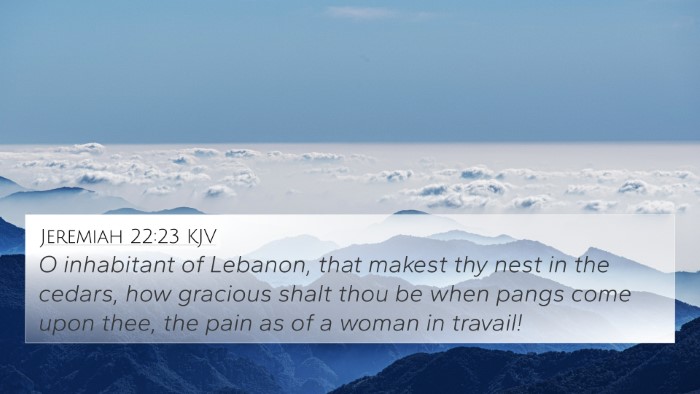
Jeremiah 22:23 (KJV) »
O inhabitant of Lebanon, that makest thy nest in the cedars, how gracious shalt thou be when pangs come upon thee, the pain as of a woman in travail!
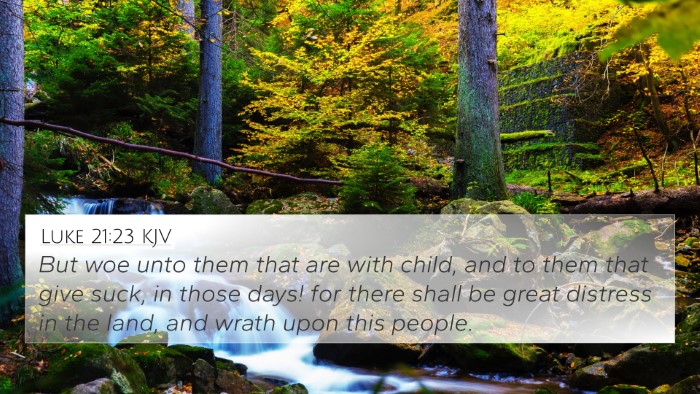
Luke 21:23 (KJV) »
But woe unto them that are with child, and to them that give suck, in those days! for there shall be great distress in the land, and wrath upon this people.
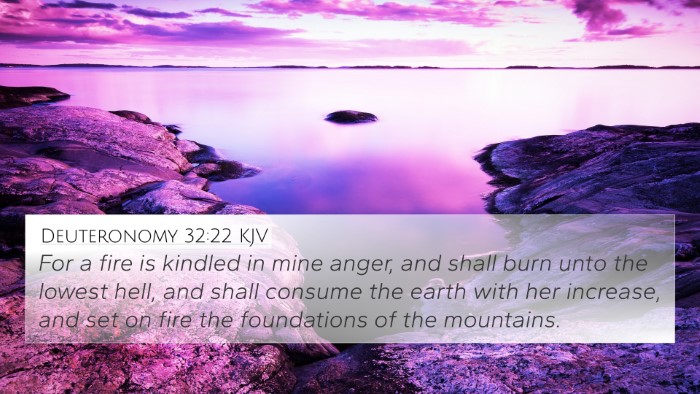
Deuteronomy 32:22 (KJV) »
For a fire is kindled in mine anger, and shall burn unto the lowest hell, and shall consume the earth with her increase, and set on fire the foundations of the mountains.
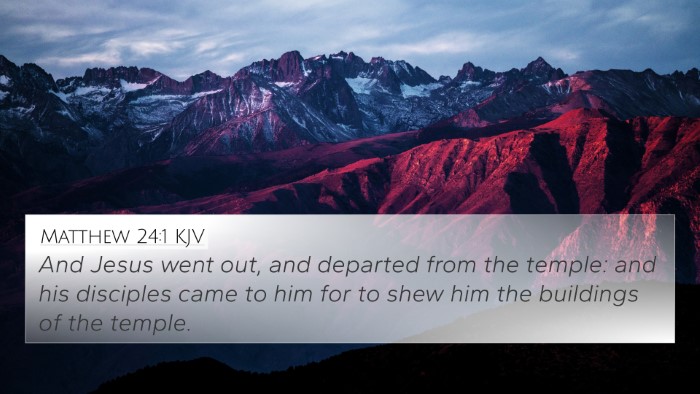
Matthew 24:1 (KJV) »
And Jesus went out, and departed from the temple: and his disciples came to him for to shew him the buildings of the temple.
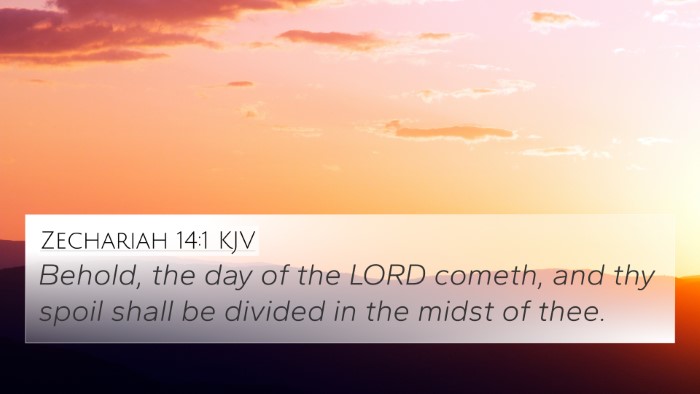
Zechariah 14:1 (KJV) »
Behold, the day of the LORD cometh, and thy spoil shall be divided in the midst of thee.
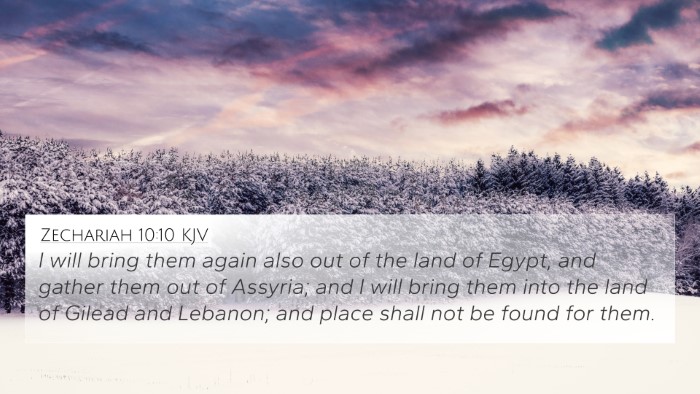
Zechariah 10:10 (KJV) »
I will bring them again also out of the land of Egypt, and gather them out of Assyria; and I will bring them into the land of Gilead and Lebanon; and place shall not be found for them.
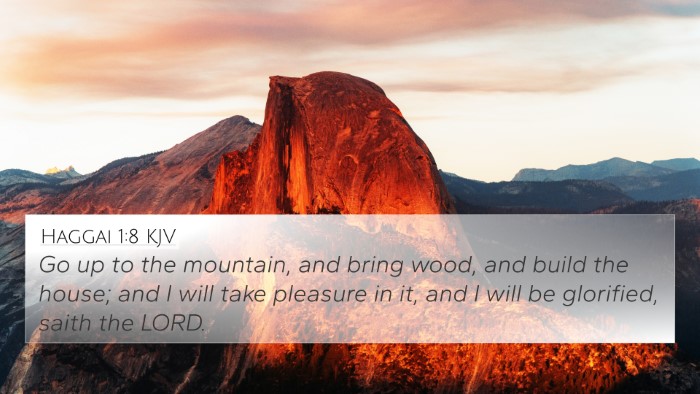
Haggai 1:8 (KJV) »
Go up to the mountain, and bring wood, and build the house; and I will take pleasure in it, and I will be glorified, saith the LORD.

Habakkuk 2:8 (KJV) »
Because thou hast spoiled many nations, all the remnant of the people shall spoil thee; because of men's blood, and for the violence of the land, of the city, and of all that dwell therein.
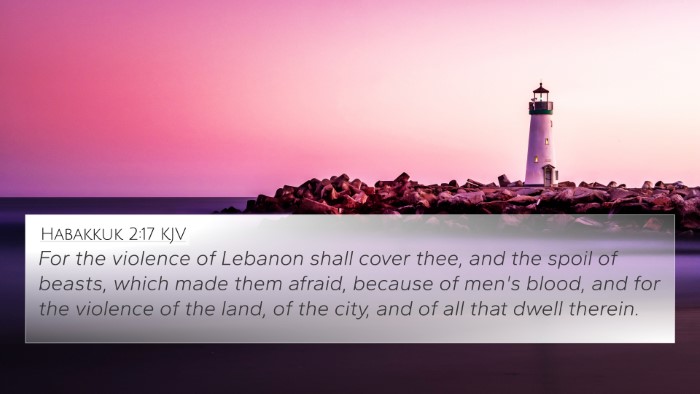
Habakkuk 2:17 (KJV) »
For the violence of Lebanon shall cover thee, and the spoil of beasts, which made them afraid, because of men's blood, and for the violence of the land, of the city, and of all that dwell therein.
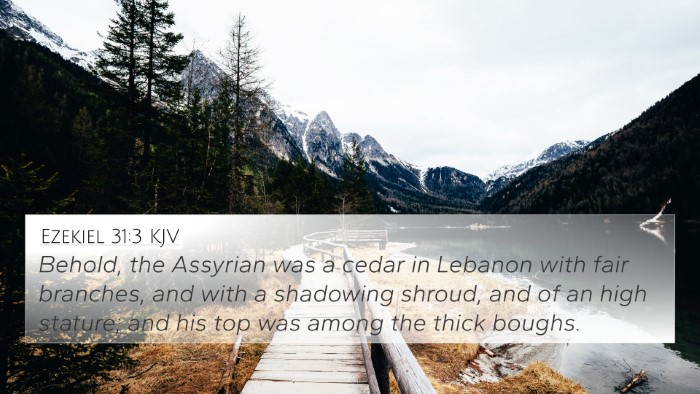
Ezekiel 31:3 (KJV) »
Behold, the Assyrian was a cedar in Lebanon with fair branches, and with a shadowing shroud, and of an high stature; and his top was among the thick boughs.
Zechariah 11:1 Verse Analysis and Similar Verses
Understanding Zechariah 11:1
Verse: "Open thy doors, O Lebanon, that the fire may devour thy cedars."
Zechariah 11:1 calls for an opening of doors, metaphorically inviting destruction upon Lebanon, known for its majestic cedars. This verse is loaded with imagery and significance that reflects the tumultuous period in which Zechariah prophesied.
Insights from Commentaries
This verse is interpreted in various ways by notable biblical commentators. Each provides essential insights into the meaning and implications of this profound scripture:
-
Matthew Henry's Commentary:
Henry discusses the desolation foretold in this verse, noting that Lebanon's cedars symbolize strength and beauty - qualities that will be decimated as the call for destruction echoes. He emphasizes the importance of recognizing the divine authority commanding such events, also hinting at the broader context of God's judgment against Israel's disobedience.
-
Albert Barnes' Notes:
Barnes elaborates on the geographical and historical significance of Lebanon’s cedars, linking them to the national pride of the region. He suggests that the "fire" mentioned signifies judgment and purification, highlighting the transition from prosperity to ruin as part of divine retribution.
-
Adam Clarke's Commentary:
Clarke offers profound insight into the metaphorical language used by the prophet. By inviting Lebanon's doors to open for embracing destruction, Clarke interprets this as a divine signal to unleash a greater calamity, which acts as a warning to the people about the consequences of their moral failings.
Connections to Other Bible Verses
Zechariah 11:1 can be cross-referenced with several significant scripture passages, enhancing our understanding of the themes presented:
- Isaiah 10:34: "And he shall cut down the thickets of the forest with iron, and Lebanon shall fall by a mighty one." This verse parallels the destructive imagery found in Zechariah.
- Jeremiah 22:6: "For thus saith the Lord unto the king's house of Judah; Thou art Gilead unto me, and the head of Lebanon: yet surely I will make thee a wilderness, and cities which are not inhabited." This emphasizes judgment and desolation similar to that in Zechariah.
- Ezekiel 17:22-24: These verses talk about God replanting a good tree, contrasting with the desolation of the previous image of destruction.
- Matthew 7:19: "Every tree that bringeth not forth good fruit is hewn down, and cast into the fire." This verse highlights divine judgment against unfruitful entities.
- Luke 19:44: "And shall lay thee even with the ground, and shall lay thy children within thee; and they shall not leave in thee one stone upon another; because thou knewest not the time of thy visitation." A warning about impending destruction, resonating with the theme of Zechariah.
- Revelation 18:8: "Therefore shall her plagues come in one day, death, and mourning, and famine; and she shall be utterly burned with fire: for strong is the Lord God who judgeth her." Reflects the idea of sudden and complete destruction.
- 1 Kings 6:15: This verse discusses the construction of Solomon’s temple using cedar wood from Lebanon, juxtaposing beauty with the impending destruction of these trees.
- Psalm 104:16: "The trees of the Lord are full of sap; the cedars of Lebanon, which he hath planted." This celebrates what Lebanon stands for, adding weight to the tragic imagery of destruction in Zechariah.
Thematic Analysis
This verse encapsulates several themes that undoubtedly resonate throughout the Bible:
- Divine Judgment: The call for Lebanon's destruction signifies God's judgment upon nations and entities failing to heed His warnings.
- Symbolism of Cedar Trees: Cedars of Lebanon often symbolize prosperity and righteousness; their destruction indicates a complete reversal of fortune.
- Restoration and Hope: Despite the bleak prophetic declarations, the theme of eventual restoration pervades the book of Zechariah, wherein repentance is always an option.
Practical Application
Understanding Zechariah 11:1 compels us to reflect on our own lives and the broader society regarding:
- Consequences of Disobedience: Just as Lebanon faced desolation, individuals and communities today must evaluate their adherence to divine principles.
- Seeking Restoration: The promise of redemption and hope should encourage believers to pursue a relationship with God fervently.
- Recognizing Divine Sovereignty: This verse serves as a reminder that God holds authority over nations and individual destinies; acknowledging this sovereignty can bring peace in tumultuous times.
Conclusion
Zechariah 11:1 is more than a mere proclamation of destruction; it is a multifaceted verse that speaks to the heart of God's judgment, the condition of His people, and the cyclical nature of despair and hope. Through cross-referencing biblical texts and understanding the comprehensive themes presented in this verse, believers can gain deeper insight into God's will and the significance of repentance and divine mercy.



